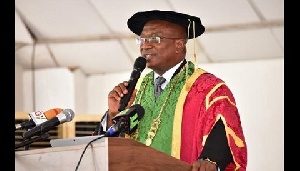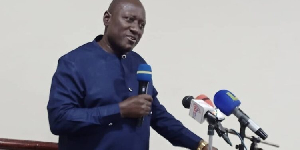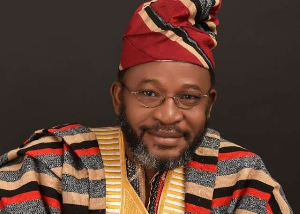Government has been asked to expand access to law education by implementing viable alternative training modules.
The Vice Chancellor of CU, Professor Bill Buenar Puplampu, suggested that Ghana moved “towards a training/examination/licensure structure that allows aspiring people to acquire the needed theoretical and applied training from specifically accredited Law Faculties.”
Prof. Puplampu made this call on during the 21st Graduation ceremony of Central University at Christ Temple of the International Central Gospel Church, Accra.
“Those who pass by set criteria can then go on to take the Bar exam organized by the Law School as an examining body,” observing that “the burden would then fall on the student to choose the best Law Faculty for their training.”
He lauded the Ghana Tertiary Education Commission (GTEC) for policing some big universities in Ghana over accreditation issues.
The Vice Chancellor requested that GTEC “look carefully at the matter of regulatory oversight exercised by professional bodies and by the Commission. We have a situation where often there are multiple demands, timelines, costs and requirements placed on HEIs concerning the accreditation or review of some programmes.”
Prof Puplampu observed that, if supported, private universities could assist government to expand the enrolment situation in Ghana if the nation implemented a Fee
Credit/Voucher system that allowed qualified students to take their fee voucher to any University of their choice.
He therefore indicated that to meet Ghana’s Higher Education gross enrolment targets, and fight challenges related to access, affordability and inclusiveness, government did not have to expand public HE space since the State cannot afford that.
“Such an approach crowds out private sector initiatives which have been so vital since the 1990s when we faced a crisis of explosion in number of aspirants to HE with very few public options available.
A viable approach is in partnering and allowing good home-grown private universities, polytechnics and specialist institutions to develop, stabilize and consolidate,” he said.
On the environment, Prof. Puplampu hinted that no amount of ‘Loss & Damage’ Funds will address “our problems here,” observing that “if we were serious about the environment, then we must be serious about the institutions and efforts which would demonstrate in concrete terms that our rules on the built and unbuilt environment were enforceable.”
To the graduating class, he said, “Difficulties, challenges, ethical dilemmas, serious life, professional and career choices will confront you.
The economy may challenge you, but if you but place your trust and life in God’s hands and choose to align your behavior, choices and values to what is proper and professional and good,” they would be able to sale through and present themselves as able ambassadors of the CU.
For the 21st Graduation, CU presented 961 students from 30 undergraduate programmes and 118 students from various graduate programmes. Of this number, 73 received 1st class degrees and 18 received special awards and commendations.
In her valedictory speech, the Overall Best Student, Ms. Joyce Nyarko from the Psychology Department, encouraged students to diligent and determined to pursue any life endeavour.
Recounting her difficult childhood, she said she grew up under very difficult circumstances that could have prevented her from getting that far, but for the fact that she was determined to soldier on irrespective of the odds.
Central University was established to training transformational leaders for the African subregion.
It is a faith-based Christian University with emphasis on developing leaders imbibed sound moral and ethical standards.
Aside the many programmes offered by the university, CU has also received accreditation to run programmes, including Diploma in Law, Diploma in Paralegal Studies, MA/MPhil in Development Policy, MA/MPhil in Educational Leadership & Administration, BEd Social Science (Secondary), MBA Project Management (18months), and Master of Public Health.
General News of Wednesday, 30 November 2022
Source: GNA













